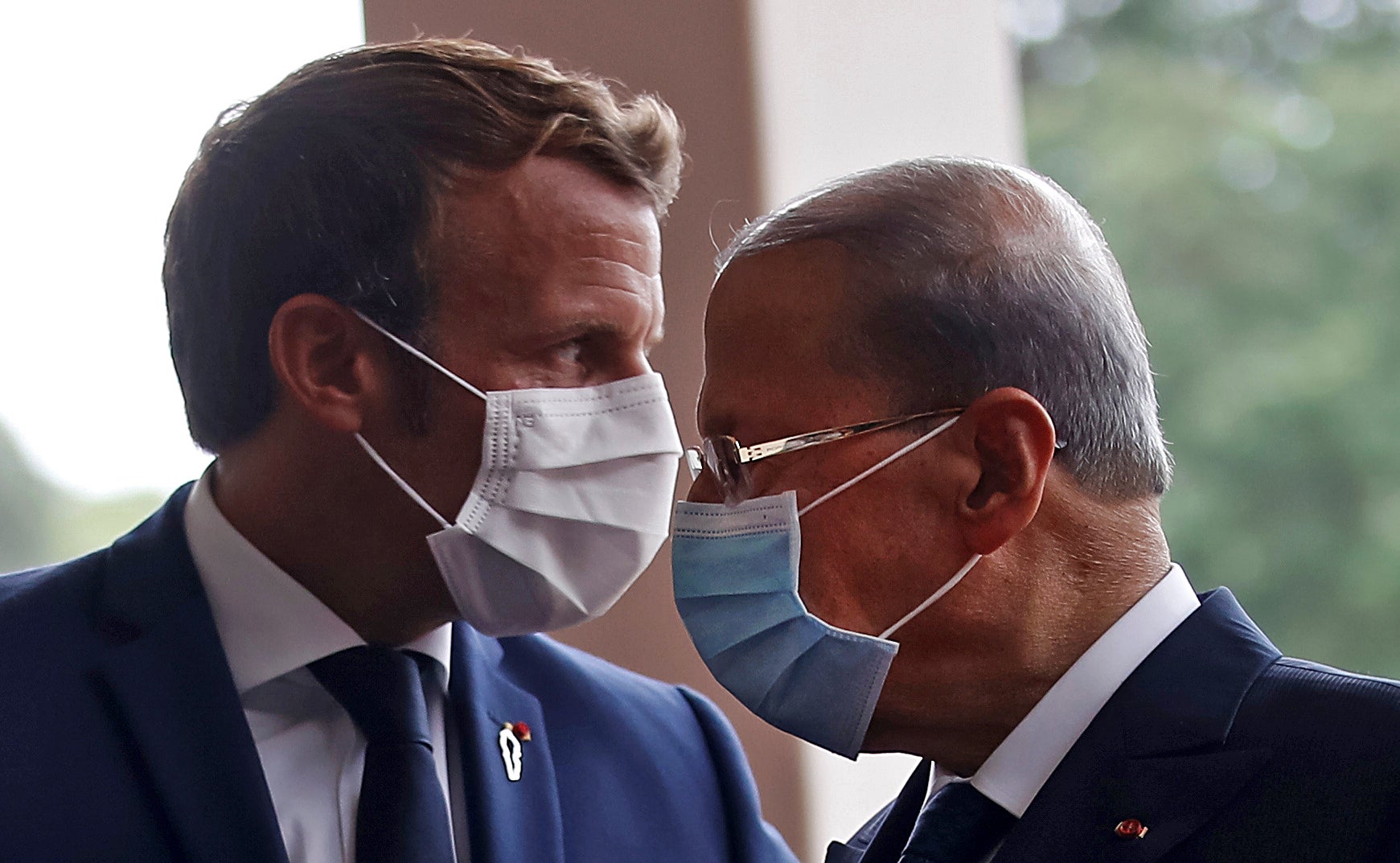Macron warns Lebanon’s leaders risk sanctions if country fails to reform
Visit comes as little-known diplomat Mustafa Adib appointed as country’s new prime minister

Emmanuel Macron has warned that Lebanese leaders could face sanctions if they do not push through much-needed reforms to pull the country back from the brink, following the explosion in Beirut and amid a crippling financial crisis.
Landing in Beirut this week for the second time in less than a month, the French president threatened to withhold a vital international financial bailout if there was no “fundamental” change.
Speaking to Politico magazine, Mr Macron said on Tuesday that now was “the last chance for this system”, acknowledging that he was a making a “risky bet” by working to stop political and economic collapse in the former French protectorate.
Mr Macron also said he was seeking “credible commitments” and a “demanding follow-up mechanism” from Lebanon’s leaders, including a legislative election within six to 12 months.
The day before he arrived, Lebanon’s president, Michel Aoun, appointed little-known diplomat Mustafa Adib as the new prime minister after he was nominated by a majority of the large political parties and leaders.
Mr Adib was the Lebanese ambassador to Germany and a key adviser and confidante of former prime minister Najib Mikati, a billionaire who was indicted in October on corruption charges, sparking concerns that the new leader would be no different to other premiers.
Protests, dubbed “the rage against a nation”, were called to coincide with Mr Macron’s visit, with crowds gathering outside parliament in Beirut on Tuesday afternoon.
Mr Adib, a dual Lebanese-French citizen, has promised to reach a bailout deal with the International Monetary Fund and speedily build a new cabinet.
The IMF welcomed Mr Adib’s nomination, saying it hoped that a new government would be formed shortly “with a mandate to implement the policies and reforms that Lebanon needs to address the current crisis and restore sustainable growth”.
Lebanese officials have warned that an IMF loan may be the country’s only lifeline.
Mr Macron, who was the first and only world leader to visit the damaged Beirut neighbourhoods, called for a serious audit of the Lebanese banking system, saying that judicial action can be taken only when “the truth of the numbers” is discovered.
Lebanese politicians, some of whom are former warlords, have overseen decades of industrial-scale state corruption. They now face a daunting task to save the crisis-stricken economy, rebuild Beirut and dampen rising sectarian tensions.
On Tuesday, gunfire broke out again in Khaldeh, a mixed coastal town just south of Beirut where deadly clashes erupted last week between Sunni and Shia residents, leaving two dead, including a 14-year-old boy.
Lebanon’s state news agency said that an army patrol had been deployed to Khaldeh but gave no further details.
Mr Macron warned last week that Lebanon could risk slipping into civil war if the situation was allowed to continue.
Lebanon is barely limping along after an enormous explosion tore through the capital last month, killing more than 190 people, injuring over 6500 and leaving some 250,000 people homeless. Although an investigation is still under way, experts have said the blast was likely caused by several thousand tonnes of poorly stored explosive materials catching fire in Beirut’s port.
The entire Lebanese cabinet resigned in the wake of the explosion after it emerged that port officials, the security forces, the president and the prime minister knew of the dangerous explosives stockpile – but apparently did nothing to prevent disaster.
The country has also faced an unprecedented financial collapse, which was similarly anchored in corruption and mismanagement and has pushed more than half the country into poverty, according to the United Nations.
Lebanon, which has reimposed lockdown, is also struggling to tackle the coronavirus pandemic, an effort made only more difficult as the blast damaged at least nine hospitals, including major Covid-19 treatment and testing facilities.
Join our commenting forum
Join thought-provoking conversations, follow other Independent readers and see their replies
Comments
Bookmark popover
Removed from bookmarks